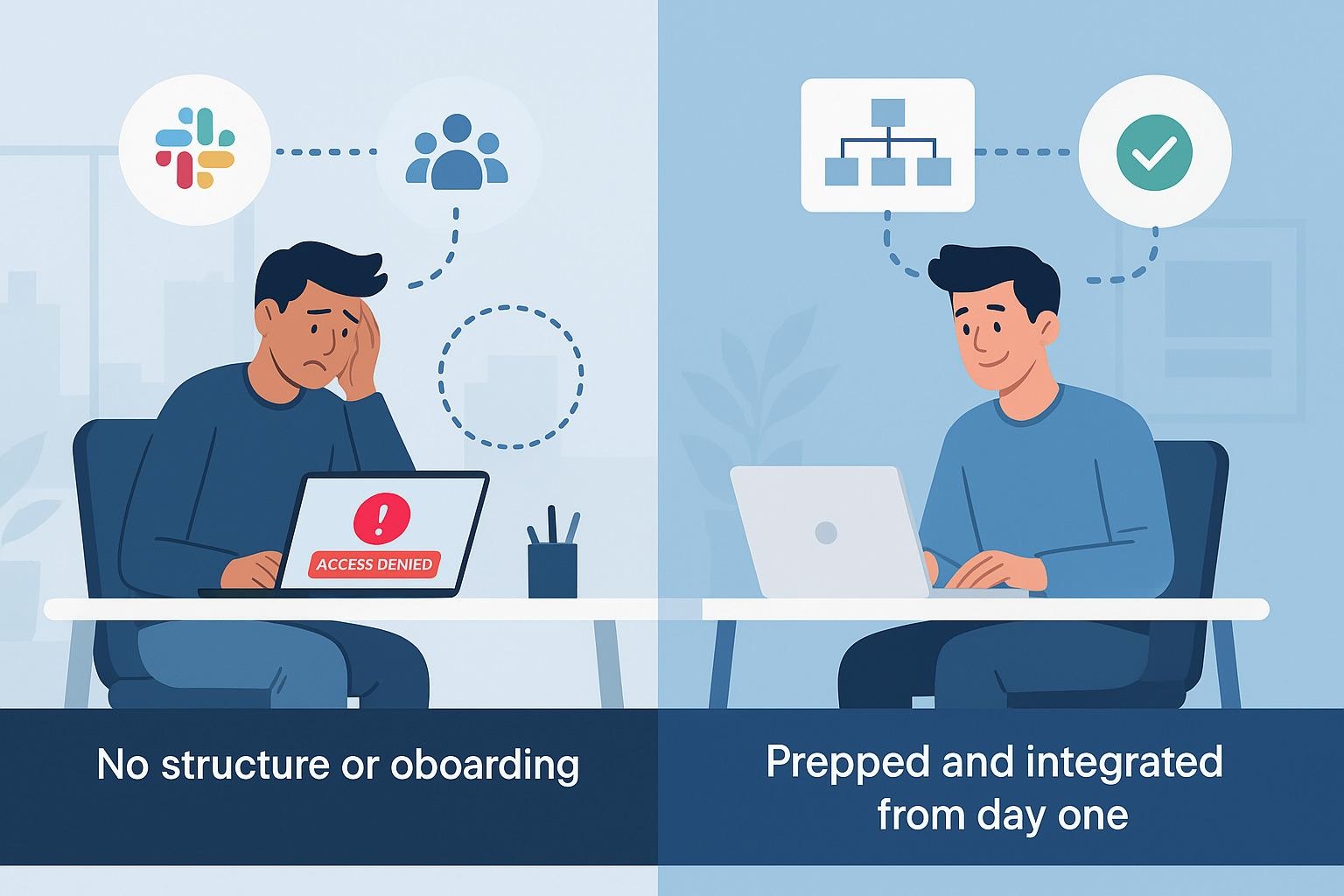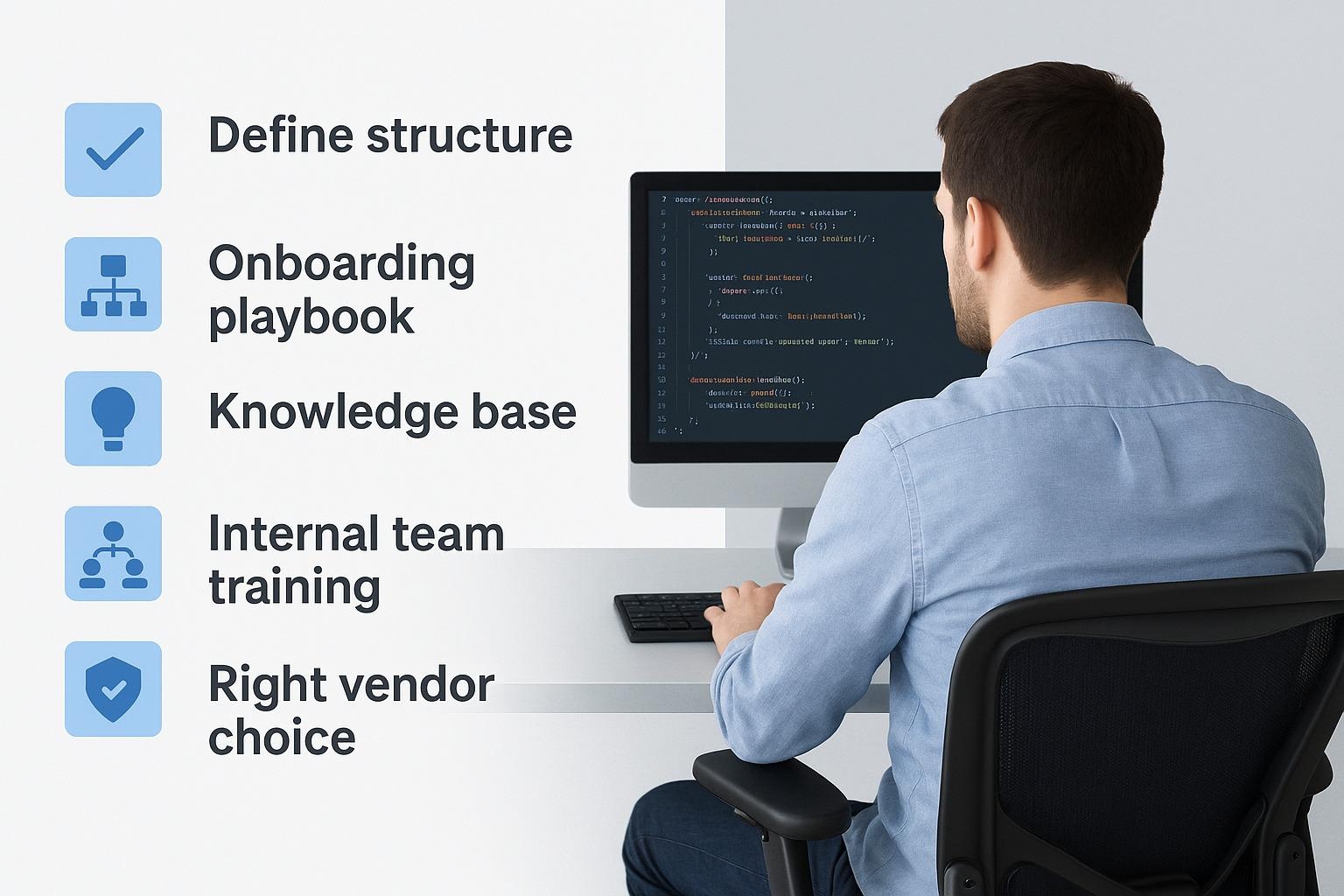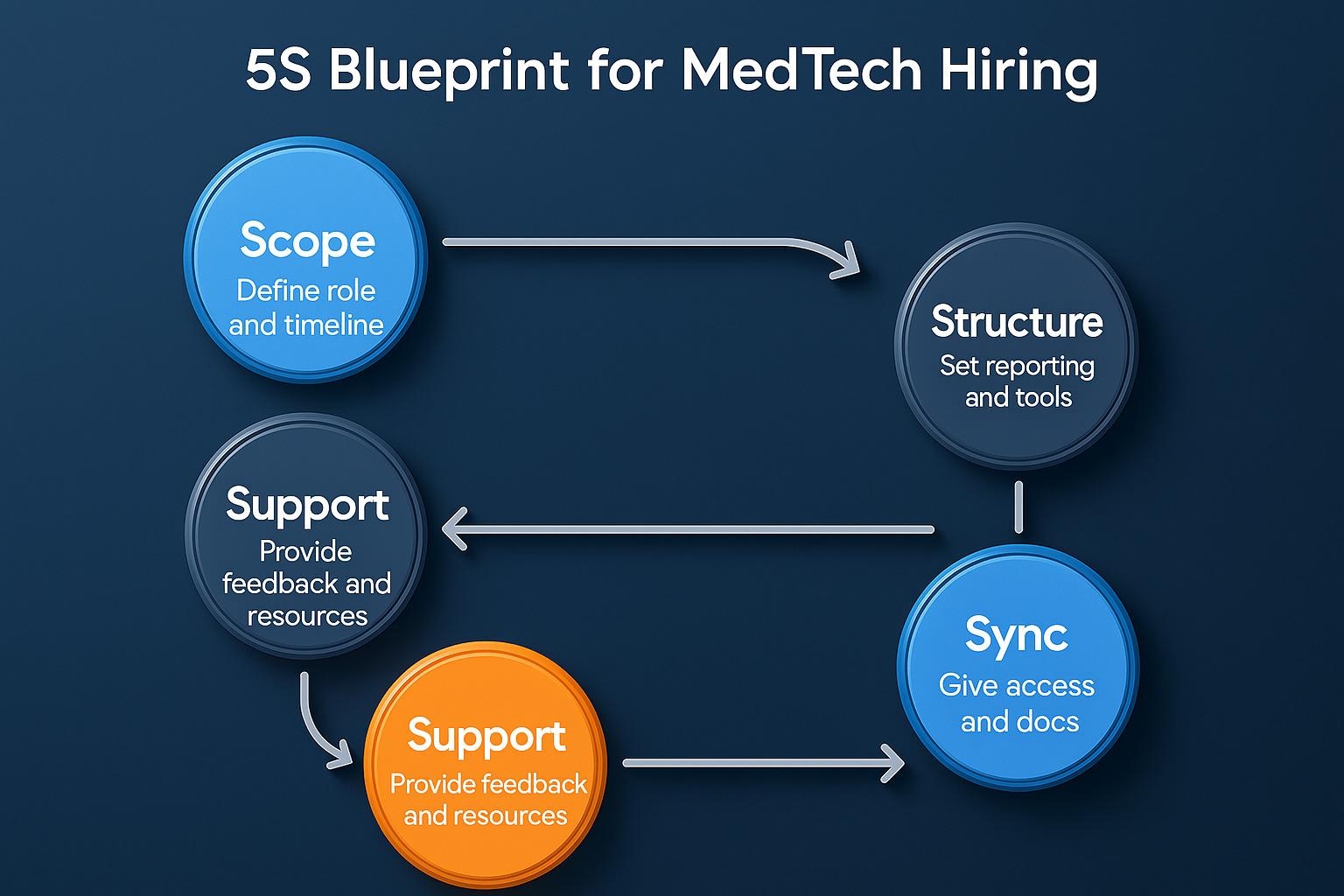As a bootstrapped MedTech founder or an early-stage startup, you’ve made the hire. Maybe it’s a contractor to help speed up your medical device product development timeline or a developer to fill a gap in your build sprint. Either way, it feels like you’re in the right direction until everyone gets stuck.

One of the primary concerns of the clients we have spoken to is integrating their MedTech short-term hires into their long-term plan. Often, they hire top talent, but a few weeks in, everything starts dragging. This is not because they hire the wrong MedTech talent, but because they were dropped into chaos: no clear structure, no access to tools, and no alignment with the team.
What went wrong?
The issue isn’t MedTech hiring. It’s integration. Most staff augmentation services stop at delivering a warm body. But without a process to absorb that person into your workflows, they’ll sit idle or worse, create confusion.
If you’re not building with integration in mind, you’re inviting delay into every short-term hire.
In this article, we’ll show you where integration fails, how to avoid it, and how we help MedTech founders like you get the best out of your MedTech hiring decisions.
Where staff augmentation services break down (and how it costs you)
You didn’t bring in short-term help to slow things down. But that’s exactly what happens when your integration process is reactive instead of intentional. Here’s where we see most MedTech startups get stuck.
A. Disconnected tools and a lack of well-defined process
One bootstrapping MedTech founder in Silicon Valley expressed frustration during our interview: “We lost two weeks just getting them access.” That’s two weeks of paying for MedTech talent with no output, all because the basics weren’t in place.
Without a defined medical device onboarding process, your hire ends up chasing login credentials, waiting on team introductions, or guessing where files live. These delays are more than operational. They chip away at your team’s trust and project momentum.
Deloitte reports that manual processes across key commercial operations such as contracting, proposal handling, and field communication often lead to inefficiencies and longer lead times. The same applies when team integration workflows are left manual and unstructured. When you don’t treat onboarding as part of your medical device development process, you create drag from day one.
At Impact Technical Resources, we address this from day one. Before your hire starts, we map out access needs, communication protocols, and documentation sources so your staff augmentation services are faster and friction-free.
When you don’t treat onboarding as part of your medical device development process, you create drag from day one. Request our free 20-hour work without commitment to see how we handle talent integration.
B. Misalignment with internal systems
You might assume a smart contractor can figure things out as they go. But even the best talent will struggle when your internal systems aren’t built for collaboration.
We’ve seen short-term MedTech talent stuck in approval loops, locked out of tools, or left trying to decode documentation not written for external users. That’s not a performance problem. It’s a system design issue.

In Deloitte’s research on healthcare technology integration, they point out that failure to align internal tools with new workflows often leads to operational friction. This translates into missed deadlines and bloated costs for MedTech teams, especially during medical device product development phases when every week counts.
At Impact Technical Resources, we build compatibility into our process. Before deployment, we audit your collaboration tools and documentation handoffs to ensure your staff augmentation services run seamlessly.
C. In-house teams reluctant to work with short-term MedTech talents
This is one of the most overlooked challenges. Most founders assume their internal team will naturally adapt to new contributors. But the reality is that short-term MedTech talent often disrupts familiar rhythms.
We’ve seen this play out repeatedly from our previous collaborations. Full-time staff unintentionally sideline contractors. They delay feedback, forget to loop them into meetings, or see external MedTech talents as competitors instead of collaborators. The result? Your temporary hire stays busy, but not aligned with what matters most.
McKinsey research on team performance during organizational shifts confirms this. Performance dips across the board when roles are unclear and expectations aren’t managed.
At Impact Technical Resources, we build internal readiness into every engagement. That includes briefings for project leads, responsibility matrices, and even collaboration norms, so everyone knows what to expect before your staff augmentation services kick in.
Integration starts with preparation, not just for your new hire, but for the team they’ll join.
What top-performing MedTech teams do differently
By now, you’ve probably realized that integration is not something you can improvise. The MedTech founders we work with who move fastest and stay compliant don’t just hire better. They integrate better. Here’s what they consistently do differently, and how we support them at Impact Technical Resources.
Define the structure before day one
They don’t wait until the hire is in the system to figure out reporting lines or project roles. Instead, they create clear ownership paths, escalation workflows, and documentation access ahead of time.
At Impact Technical Resources, we help our clients map these out before their short-term MedTech professionals even log in. That’s part of what makes our MedTech staff augmentation services easier to activate.
Use a plug-and-play onboarding playbook
Top teams do not guess their way through onboarding. They give every temporary contributor a quick-start guide with exactly what they need.
We help MedTech startups build custom onboarding kits aligned with their medical device development process and compliance workflows. This ensures every hire gets up to speed in days instead of weeks.
Maintain a centralized knowledge base
Documentation chaos is one of the biggest slowdowns in fast-moving teams. High-performing startups use a single source of truth for process documentation, access protocols, escalation contacts, and more.
We create and manage internal knowledge hubs for our clients, which support in-house teams and external talent. This guarantees consistency and prevents rework.
Train your internal team to work with short-term hires
The most successful teams recognize that their full-time staff need to adapt too. They provide light-touch training, clarify expectations, and make collaboration part of the team culture.
We equip project leads and managers with checklists and readiness sessions so your team becomes integral to the solution.
Partner with vendors who understand MedTech consulting
High-performing teams do not work with generalist agencies or random freelancers with menial knowledge of the MedTech industry. They choose partners who understand medical device product development, regulatory constraints, and the need to move fast without compromising quality.
At Impact Technical Resources, we do more than fill roles. We help you build a repeatable, scalable integration process that supports your growth. Check out our guide on how to choose between freelancers and MedTech staff augmentation platforms like Impact Technical Resources.
Turn integration into your MedTech advantage
The right hire is only half the equation. What determines your outcome is what happens after they join.

Staff augmentation services only deliver results when they’re paired with a repeatable integration process. That’s why at Impact Technical Resources, we use a five-part framework to help you move fast without losing alignment.
We call it the 5S Blueprint for MedTech Hiring:
- Scope: Define the role, success metrics, and timeline.
- Structure: Map reporting lines, tools, workflows, and touchpoints.
- Setup: Handle access, compliance, and documentation before day one.
- Sync: Prepare your internal team for collaboration and context.
- Support: Give your hire the knowledge base and feedback needed to thrive.
This system turns short-term MedTech talent into immediate contributors. It also prevents the delays and disconnects that stall medical device product development.
Founders who work with us get more than speed. They also get a structure that supports innovation and reduces risk.
Want to see how this works in real-time?
Start with our free 20-hour technical development support. We’ll pair you with expert talent and walk you through our onboarding and team readiness model.


